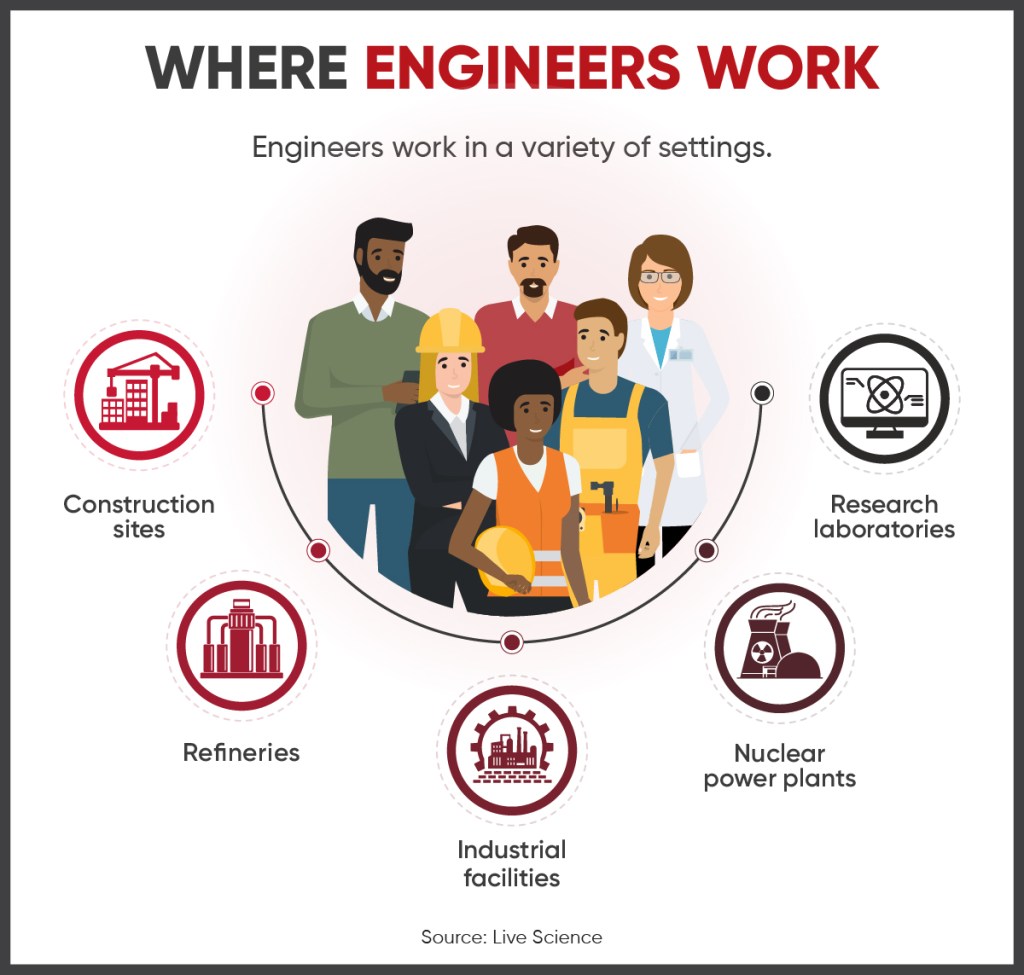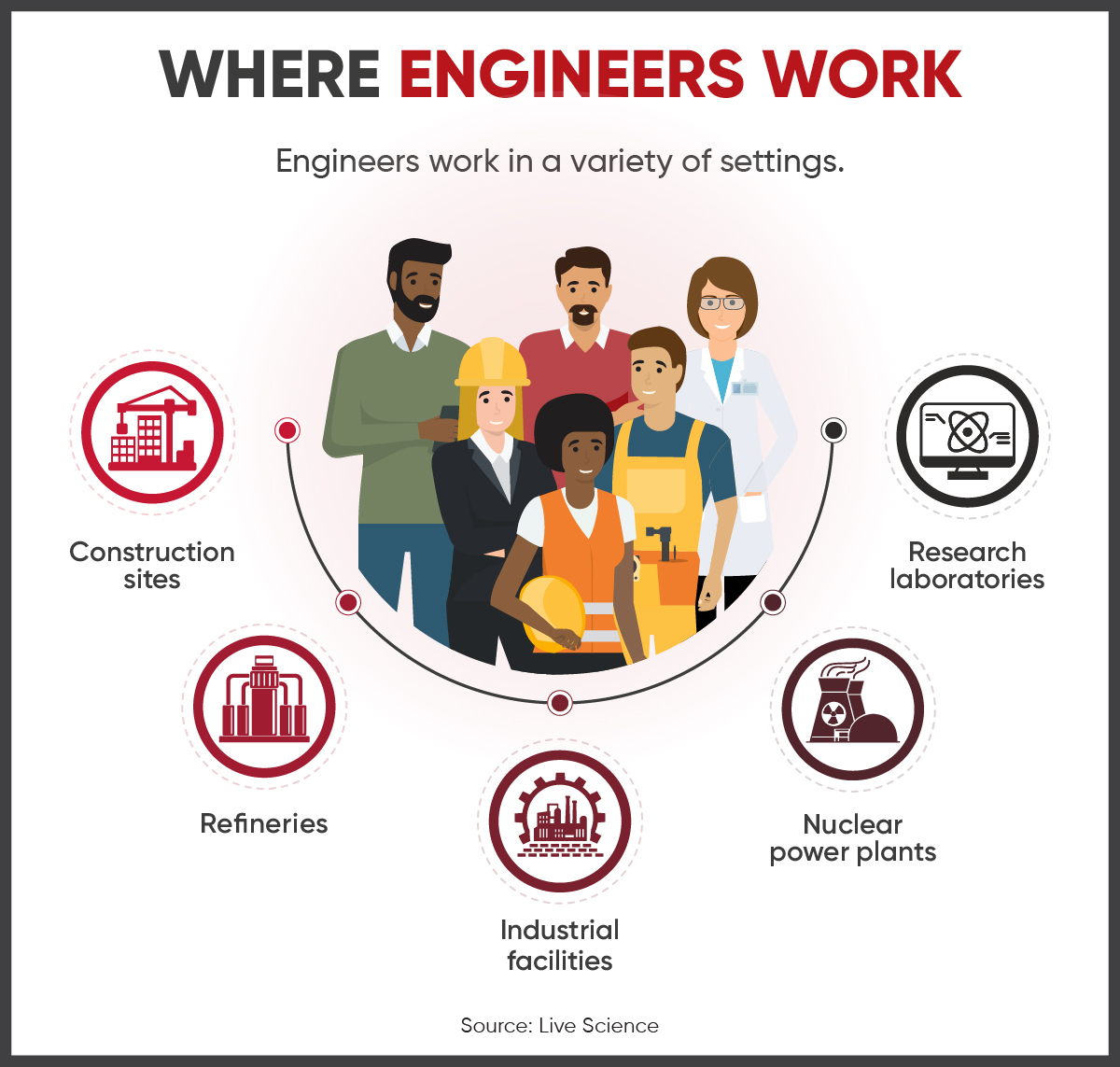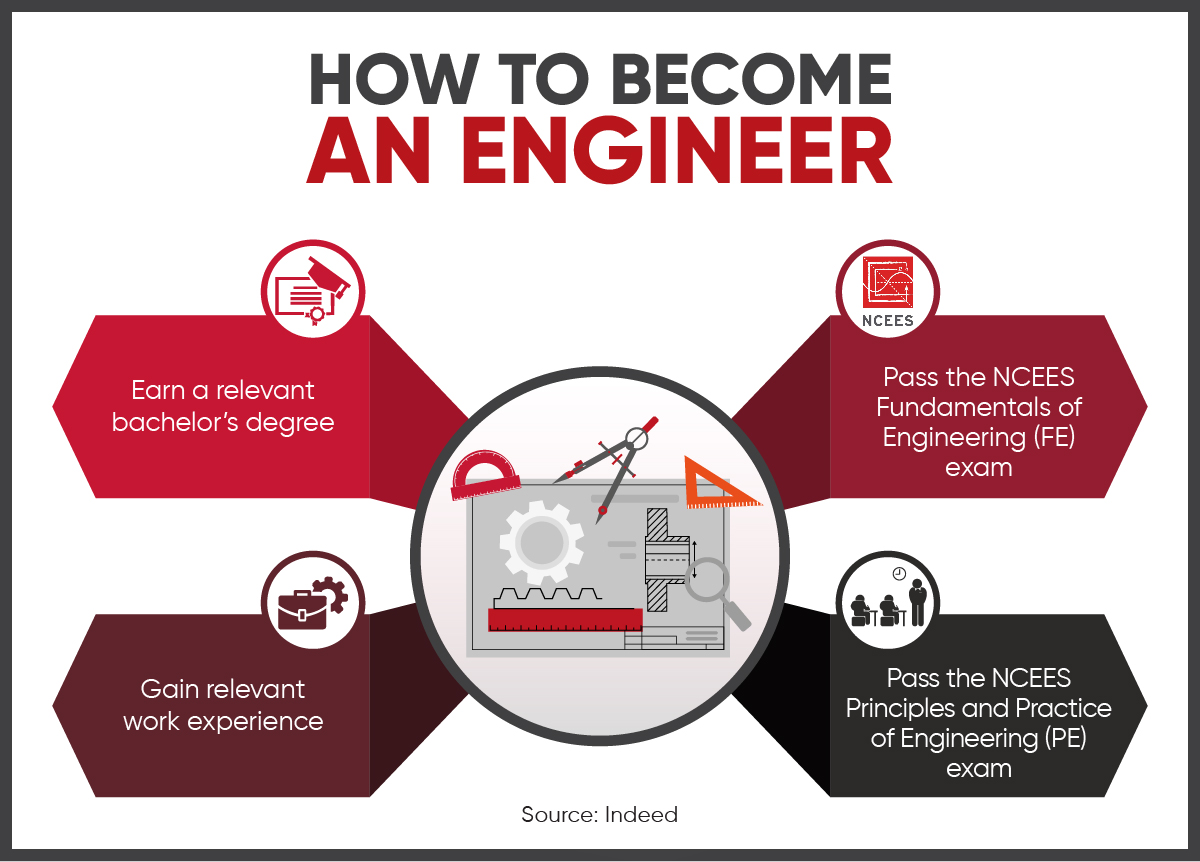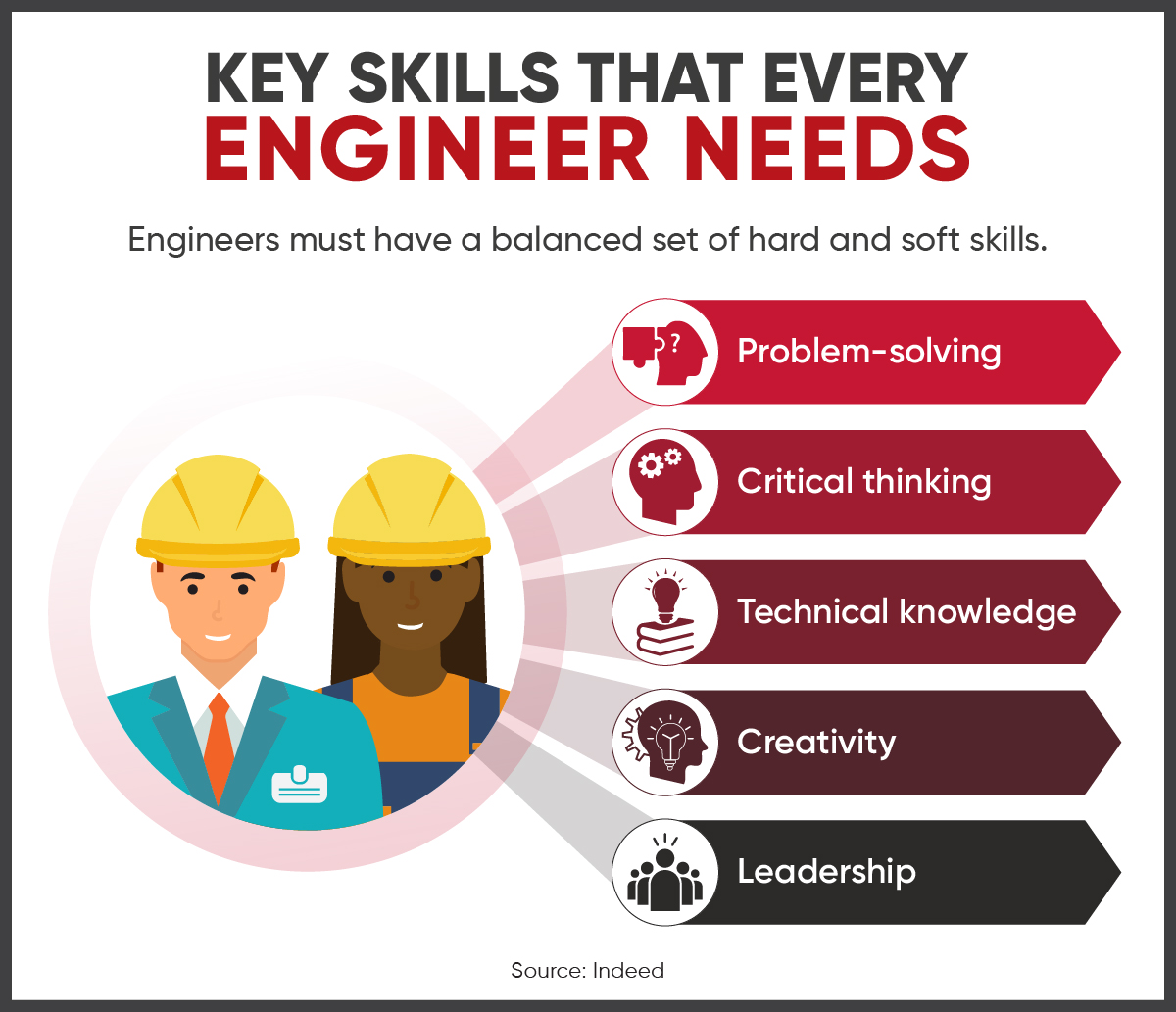6 Types of Engineers: What They Do, Outlook, and Salary

Table of Contents
Engineering is part of everyday life — from the cars we drive to the water we drink. Engineers around the globe design, develop, and maintain the technologies and systems that drive modern society. Cellphones, bridges, agricultural equipment, and household appliances are just a few examples of products that were conceived of and designed by engineering professionals.
Students interested in working in an industry that’s driven by design and innovation — such as chemical engineering, civil engineering, and production engineering — may find that careers in engineering align with their goals. Below are just a few of the types of engineering career paths that individuals can choose from.

Engineers work in a variety of settings, according to Live Science, including construction sites, refineries, industrial facilities, nuclear power plants, and research laboratories.
What Are the 6 Types of Engineers?
All engineering fields focus developing, creating, or improving structures and systems. However, career paths in the profession diverge widely, spanning everything from working with chemicals, to designing buildings and other structures, to ensuring computer network systems work seamlessly.
Consequently, aspiring engineering professionals have a number of career paths to consider. For example, students interested in developing and testing airplanes, missiles, and spacecraft may be drawn to aerospace engineering. On the other hand, professionals interested in designing and building machinery may prefer a career in mechanical engineering.
The following are the six most common types of engineers, including their educational prerequisites and common salary ranges.

Becoming an engineer requires the following, according to Indeed: 1. Earn a relevant bachelor’s degree. 2. Pass the NCEES Fundamentals of Engineering (FE) exam. 3. Gain relevant work experience. 4. Pass the NCEES Principles and Practice of Engineering (PE) exam.
1. Chemical Engineer
Chemical engineers apply key principles of mathematics, biology, chemistry, and physics to create and manufacture various products. Whereas some professionals in the field work at refineries to transform crude oil into products such as asphalt, heating oil, gasoline, and lubricating oil, others work at companies that convert other raw materials, such as beeswax, into candles, home and body creams, and furniture polish.
Although some job duties for chemical engineers, such as estimating production costs, are uniform across the field, others can vary widely depending on the company. Common daily duties may include:
- Conducting tests and monitoring the performance of various processes
- Troubleshooting problems that arise in the manufacturing process
- Developing methodologies for separating components in gasses and liquids
- Conducting research designed to improve manufacturing processes
Most chemical engineers work full time, Monday through Friday, in laboratories or offices. Some professionals in the field travel to visit plants and worksites.
Chemical Engineer Education Requirements, Salary, and Job Outlook
Data from the U.S. Bureau of Labor Statistics (BLS) shows that aspiring chemical engineers typically need a bachelor’s degree in a related field, such as chemistry or chemical engineering, to be considered for employment in the field. Some employers prefer to hire candidates who have completed internships or gained cooperative industry experience as part of a degree program.
The BLS reports that as of May 2021, the median annual wage for chemical engineers was $105,550, with those in the top 10th percentile earning more than $187,430 and those in the lowest 10th percentile earning less than $62,730. Salary ranges in the field vary based on numerous factors, such as experience level, the specific company, and whether the professional has completed an advanced degree.
The employment outlook for chemical engineers is favorable, with the BLS projecting that the number of positions in the field will grow by 9% between 2020 and 2030, which is about as fast as the projected average. The BLS estimates approximately 1,800 job openings to become available each year during that period.
2. Civil Engineer
Civil engineers conceptualize, build, and design infrastructure projects such as roadways, airports, tunnels, and water and sewage plants. Some professionals work directly with state and local government agencies, while others work with construction or engineering firms.
Civil engineers’ job duties can vary widely depending on their area of specialization. They might specialize in earthquake engineering, highway engineering, traffic engineering, architectural engineering, or fire protection engineering, for example. Whichever area a professional specializes in, common duties may include the following:
- Surveying reports and analyzing long-term plans
- Evaluating project and construction costs
- Evaluating potential environmental hazards and the potential environmental impact of each project
- Overseeing the maintenance and repair of public and private infrastructure projects
Most civil engineers work full time, Monday through Friday, in office settings. However, some professionals travel to visit construction sites to troubleshoot problems.
Civil Engineer Education Requirements, Salary, and Job Outlook
The BLS reports that most companies prefer to hire civil engineers who hold at least a bachelor’s degree in a related field, such as construction or civil engineering technologies. Courses in a civil engineering program often include extensive study of statistics, mathematics, engineering systems, and fluid dynamics, depending on a student’s specialization. Students who gain practical experience via internships or cooperative learning programs are likely to have the best job prospects.
BLS data shows that as of May 2021, the median annual wage for civil engineers was $88,050, with those in the top 10th percentile reporting annual earnings of more than $133,320 and those in the lowest 10th percentile earning less than $60,550. Salary ranges can vary extensively depending on geographical region, whether an applicant has completed an advanced degree, and whether an individual works for a state, publicly traded, or privately owned organization.
The BLS expects employment in this profession to grow by 8% between 2020 and 2030, which is about as fast as average. It also projects approximately 25,000 new job openings each year during that period.
3. Electrical Engineer
Electrical engineers design and test various types of electrical equipment, such as power generation systems, electric motors, and electrical equipment. Professionals in this field often work with a wide variety of electrical equipment, such as radar and navigation systems, wiring for commercial and residential buildings, and computer circuit boards. Although the day-to-day responsibilities of electrical engineers can vary widely, common duties include the following:
- Designing and implementing new ways to use electrical power
- Directing and overseeing the manufacture, testing, and installation of electrical equipment
- Working with project managers to ensure projects are completed correctly, on time, and on budget
- Performing calculations to ensure construction and manufacturing standards are met
Most professionals in this field work full time, Monday through Friday, in office settings. However, they may travel to construction sites to help resolve problems.
Electrical Engineer Education Requirements, Salary, and Job Outlook
Aspiring electrical engineers must complete at least a bachelor’s degree in a related field, such as electronics engineering or electrical engineering. Coursework in these programs focuses on topics such as electrical circuit theory, mathematics, and digital systems design. Students who participate in a cooperative study program, which provides an opportunity for practical work in addition to classwork, may have enhanced job prospects.
The BLS reports that as of May 2021, the median annual wage for professionals in this field was $100,420, although earners in the top 10th percentile reported annual earnings of more than $162,930. Earners in the bottom 10th percentile earned less than $62,360. Salary ranges for electrical engineers can vary widely depending on an applicant’s experience, education, and geographic region.
The BLS also projects overall employment in this field to grow 7% between 2020 and 2030, which is about as fast as average. Furthermore, it expects approximately 22,700 jobs to become available each year during that period.
4. Mechanical Engineer
Mechanical engineers design, develop, and test a variety of mechanical devices, such as sports and sound equipment, microsensors, robots, car engines, and manufacturing equipment. Whereas some professionals in this field work with small companies or startups, others work with major global corporations. Industries that hire mechanical engineers include health and medicine, air and space, robotics and manufacturing, and transportation and infrastructure.
The day-to-day responsibilities of a mechanical engineer can vary significantly depending on their industry; however, common duties often include the following:
- Developing and testing prototypes of their designs
- Analyzing problems to determine which types of mechanical devices could be used to solve each problem
- Analyzing test results and making changes to designs as needed
- Overseeing devices’ manufacturing processes to ensure design specs are being followed
Most mechanical engineers work full time in office settings, although some may travel to worksites to work on malfunctioning equipment.
Mechanical Engineer Education Requirements, Salary, and Job Outlook
The BLS reports that mechanical engineers often need to have completed a bachelor’s degree in a related field, such as engineering technology or mechanical engineering, to be considered for roles in the field. Coursework in these programs is often hands-on and focused on the practical application of engineering concepts and technology. Internships and cooperative study programs are often emphasized.
As of May 2021, the median annual wage for mechanical engineers was $95,300, according to the BLS. Earners in the top 10th percentile reported salaries of more than $136,210, while those in the bottom 10th percentile reported salaries of less than $60,750. Similar to other engineering profession, salary ranges for mechanical engineers can vary widely depending on the company an individual works for, whether they’ve completed a bachelor’s or master’s degree, and the city and state they’re employed in.
The BLS expects the employment of mechanical engineers to grow by 7% between 2020 and 2030, which is about as fast as average. The bureau also projects approximately 22,200 job openings to become available each year during that decade.
5. Aerospace Engineer
Aerospace engineers are primarily concerned with designing, developing, and producing aircraft and spacecraft, national defense systems, satellites, and missiles. Whereas some professionals in this field specialize in a specific product, such as military fighter jets, others specialize in areas such as navigation and control systems. Most aerospace engineers are employed by aerospace and parts manufacturing companies, engineering firms, and the federal government.
Although the exact duties of professionals in this field can vary widely depending on their specialization, common duties may include the following:
- Ensuring each project meets quality standards
- Determining whether each proposed project meets its defined goals and will result in safe operations
- Coordinating and directing the design, testing, and manufacture of aerospace and aircraft products
- Inspecting damaged or malfunctioning equipment to identify the cause of, and solutions for, various problems
Aerospace engineers often work full time in office settings, although some professionals in the field may need to work overtime hours to ensure projects meet design and functionality standards.
Aerospace Engineer Education Requirements, Salary, and Job Outlook
Individuals interested in pursuing this career path often need to hold a bachelor’s degree in a related field, such as engineering, mechanical engineering, or aerospace engineering. Coursework in these programs often includes classroom and practical study modules. Some colleges and universities offer cooperative programs that provide students with practical experience while they work toward their degrees.
The BLS reports that as of May 2021, the median annual wage for aerospace engineers was $122,270, with earners in the top 10th percentile reporting annual earnings of more than $168,370 and earners in the bottom 10th percentile earning less than $77,440. The salary range for aerospace engineers can vary significantly depending on their experience; whether they work for a publicly traded, privately owned, or government institution; and the geographical region of the position.
Job outlook for this profession is favorable, as the BLS predicts that employment of aerospace engineers will grow by 8% between 2020 and 2030, which is about as fast as average. The BLS also projects approximately 4,000 job openings to become available each year that decade.
6. Production Engineer
Production engineers oversee production operations at factories and manufacturing facilities. In addition to developing systems designed to improve safety, efficiency, and profit, they also troubleshoot and identify problems in production lines, attend conferences and seminars to stay current on best practices and emerging technologies, and implement safety protocols. Similar to mechanical engineers, production engineers work in a wide variety of industries, such as healthcare and biotechnology, the automotive industry, and the petroleum industry.
Day-to-day job duties for production engineers can vary significantly depending on their industry; however, common duties may include the following:
- Inspecting manufacturing facilities to assess and improve performance
- Working with buyers and project managers to maintain a steady flow of supplies
- Developing specifications for the design and manufacturing of various pieces of equipment
- Evaluating work samples to ensure design and functionality standards are met
Most production engineers work full time in office settings, although in some instances, professionals need to travel to manufacturing facilities to ensure manufacturing specifications and activities are being followed.
Production Engineer Education Requirements, Salary, and Job Outlook
The BLS does not have a standalone category for production engineers; instead, it classifies them under the blanket category of industrial engineers. The agency notes that similar to other engineering professionals, production engineers typically need a bachelor’s degree in a related field, such as industrial engineering or engineering technologies. Coursework in these programs often includes classroom and laboratory learning modules, where students gain hands-on, practical experience.
The BLS reports that as of May 2021, the median annual wage for professionals in this field was $95,300, with earners in the top 10th percentile reporting annual earnings of more than $129,620, and the lowest 10th percentile reporting earnings of less than $60,850. Salary ranges for production engineers can vary widely from employer to employer and can also be affected by an applicant’s experience level and education.
Additionally, the BLS predicts that employment in this field will grow by 14% between 2020 and 2030, which is faster than average. It expects approximately 23,300 positions to become available each year during that period.

Engineers must have a balanced set of hard and soft skills, according to Indeed: problem-solving, critical thinking, technical knowledge, creativity, and leadership.
Other Types of Engineering Careers
Students interested in engineering roles can also pursue a number of other paths. Other types of engineers include the following:
Network Engineer
Network engineers, sometimes called network architects, design and build local area networks (LANs), intranets, and wide area networks (WANs). They may upgrade software, such as firewalls, and hardware, such as network adaptors, in addition to researching new technologies to support a company’s information technology systems. The BLS reports that as of May 2021, the median annual wage for network engineers was $120,520.
Agricultural Engineer
Agricultural engineers develop systems to improve agricultural and aquacultural processes, such as machinery to enhance the production and distribution of crops and seafood, as well as land preparation. They also research and plan for environmental factors, such as rain, wind, and wildlife, that could impact crop production. The BLS reports that as of May 2021, the median annual wage for agricultural engineers was $82,640.
Nuclear Engineer
Nuclear engineers research, conceptualize, and develop systems to derive power from nuclear energy. They monitor operations at nuclear facilities to ensure safety and workforce protocols align with state and federal safety regulations, and in some cases, they design and develop nuclear equipment, such as radiation shielding. Data from the BLS shows that as of May 2021, the median annual wage for nuclear engineers was $120,380.
Marine Engineer
Marine engineers design, develop, and maintain various types of equipment used at sea, such as underwater craft, boats, and offshore platforms. They prepare detailed drawings of construction layouts and schematics, test machinery and investigate mechanical failures, and oversee construction schedules. The BLS reports that as of May 2021, the median annual wage for professionals in this field was $93,370.
Preparing for a Career in Engineering
Students interested in a field that allows them to innovate, solve problems, and make a mark on the world will find that a career in engineering can allow them to create things that matter — and make the world a better place. Whatever type of engineer you’d like to be — a mechanical engineer, aerospace engineer, production engineer, network engineer, marine engineer, or chemical engineer — choose a path that inspires you.
Infographic Sources
Indeed, “12 Essential Engineering Skills for Your Resume”

